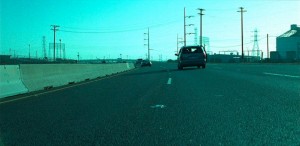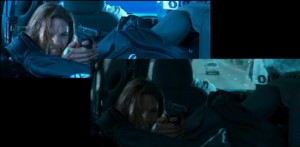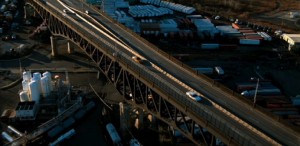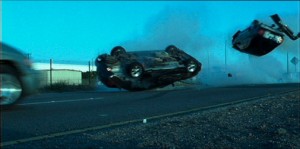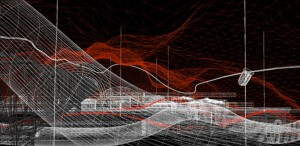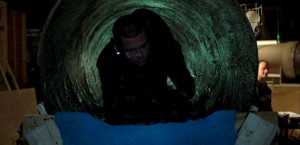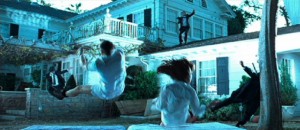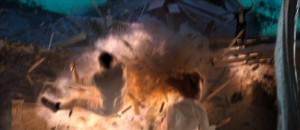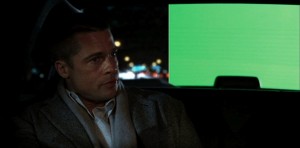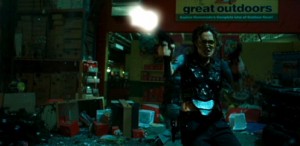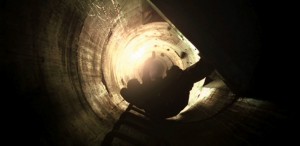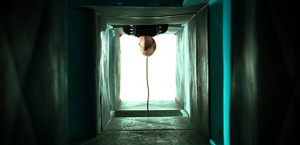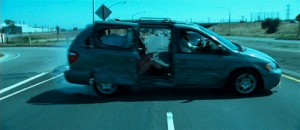Known for their work in such films as Flight of the Phoenix and Constantine, Mr & Mrs Smith represents the 17th feature film project for Furious FX. In our first fxPodcast, Mike Seymour chatted with Scott Dougherty and David Lingenfelser about the company’s work on the job. Check out some before and after frames while you listen to the interview. (update: fxPodcast is now live)
Furious FX has just completed work on Mr & Mrs Smith. Below are a set of before and after shots showing the day for night, CGI and compositing work the team did for the film. Furious FX worked for over a year on the project completing 120 shots – nearly all composited in Shake.
To relocate the chase action from Los Angeles, where it was shot, to the east coast, a live action background of the minivan required rotoscope and tracking work in order to composite in a New York City skyline.
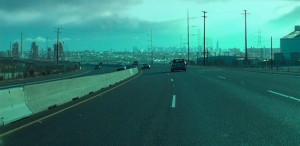
A new cloud plate was also added to the background element in order to create a darker look for the city.
The majority of interior shots during the minivan chase were shot bluescreen and composited with matching background plates. Due to the quick movements of the actors inside the van, rotoscope was required in many instances to further separate them from the screen. As the weather varied wildly during the shooting of this sequence, extreme lighting adjustments and interactive light passes were added in 2D to better match the surrounding outdoor footage. Digital camera moves were applied in post to further sell the idea of chaotic driving. In several shots throughout the scene, muzzle flashes were added to the guns, ricochet marks to windshields, and CG particles in the form of sparks and shattered glass to sell the interactivity.
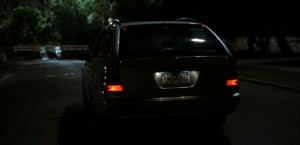 Car Comps
Car Comps
So that no actor was harmed when Mrs. Smith abandons her husband in the back of a speeding station wagon.
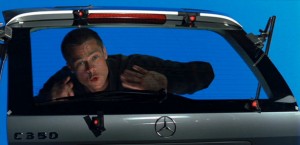
A bluescreen element was shot to capture Mr. Smith’s surprised reaction behind the glass of a rear window. A live action stunt car with red tracking markers was driven over a railing into the woods through the use of a stunt ramp that was later digitally removed.
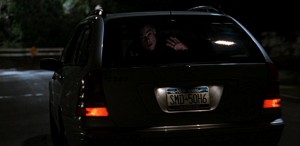
The two elements were then tracked and composited together. For added interaction, CG leaves and dirt were animated to enhance the impact, as well as lighting effects on the dirt mound to coincide with the car’s headlights. The actor element was reanimated at the impact point to accentuate the jolt when the car hits, and an overall camera move started tighter on the actor for recognition, then pulled back to actual scale for the jump.
In order to create a wide helicopter shot with the chase choreography desired, CG cars and their shadows were added to the right side of a freeway live action background.
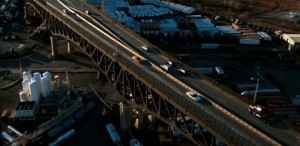
A varispeed process to quicken the pace of the background plate resulted in a faster, edgier camera move.
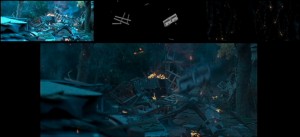 Debris
Debris
All falling debris (including wooden boards, kitchen sink), embers, and smoke trails were created in 3D and composited into a live action background plate with the actors. Shadows of falling objects were applied to the ground, and the overall atmosphere was enhanced with smoke. The fire on Brad’s boot was added in 2D.
While the BMW’s were practically flipped for the minivan chase, some enhancements were required to complete the action.
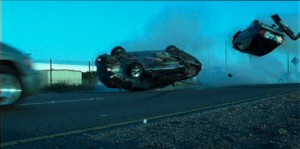
During scenes where the cars are flying, one wheel was completely removed digitally and replaced with a CG axel. A 3D tire was modeled, textured, lit, and animated to fly off of the car and roll to the curb in several cuts.
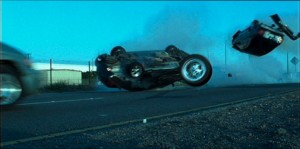
CG smoke and well-timed 2D ground smudges were added to tie the tire into the road as it bounced out of frame.
The most extensive of the set extensions involved the transition between three live action plates: jail cell, hallway, and street level outside a courthouse.
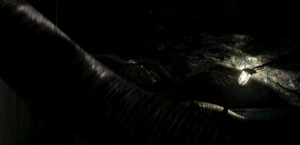
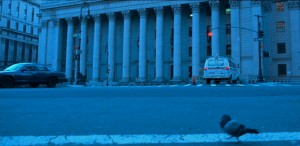 The three live action plates were first re-animated in order to create a more fluid camera move. A CG vent and tunnel were created for travel between the cell and hallway, then an underground cavern of pipes and ducts allows travel from the hallway to the street above. The initial vent pullback involved the generation of CG atmospheric dust through which the camera passed.
The three live action plates were first re-animated in order to create a more fluid camera move. A CG vent and tunnel were created for travel between the cell and hallway, then an underground cavern of pipes and ducts allows travel from the hallway to the street above. The initial vent pullback involved the generation of CG atmospheric dust through which the camera passed.
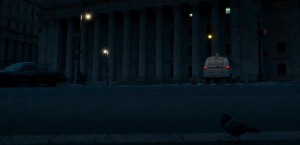 When traveling through the hallway section, there was the need to build a CG ceiling and archway in order to close off this area, as well as adding CG walls and tile floor that matched the existing set. This extension work allowed for the extreme camera pullback. At street level, a courthouse plate was treated from daytime, when it was shot, to a nighttime look. 2D effects were added to give the street and van lights some life. The pigeon is live action.
When traveling through the hallway section, there was the need to build a CG ceiling and archway in order to close off this area, as well as adding CG walls and tile floor that matched the existing set. This extension work allowed for the extreme camera pullback. At street level, a courthouse plate was treated from daytime, when it was shot, to a nighttime look. 2D effects were added to give the street and van lights some life. The pigeon is live action.
For a scene in a sewer pipe, the actor was shot on a live action set piece, and a CG set extension was built to add the missing section. CG water was also blended into the foreground.
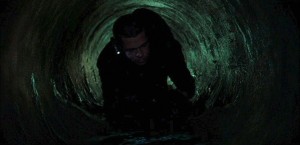
The house explosion combined a live action plate of the house with actors, a greenscreen model house exploding, and CG debris.
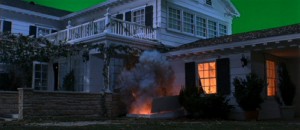
A separate greenscreen pass was shot of legs in order to create the sense that the Smiths are being blown right past camera.
Certain assassins were relocated, and all muzzle flashes added. An overall digital camera shake helped create a more perilous feel.
A greenscreen cab with actor was shot on set and composited with city backgrounds. Interactive lighting was enhanced, and an overall camera move applied to give more of a driving motion.
2D muzzle flash frames, as well as interactive light to better integrate them, were added in many scenes to enhance gunfire during action sequences.
A CG tunnel was built to extend the set, with chunks of 3D debris falling in the foreground. A digital water effect was created to tie in with the action along the tunnel wall.
A CG set extension finishes off the live action air duct into which the actor drops. Red lasers were created and animated as a 3D effect.
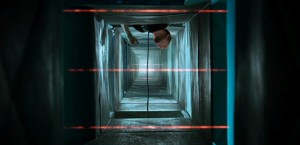
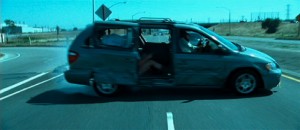 The Van was altered digitally.
The Van was altered digitally.
To give the sense that the van door was open, the existing door was hand rotoscoped to create a matte allowing for a background replacement.
Several sections of live action freeway were carefully stitched together to create a clean plate that was composited into the rear side of the foreground van.

